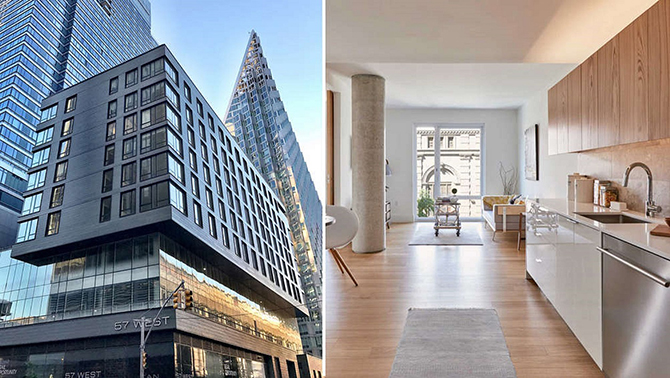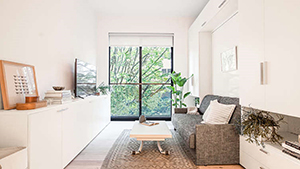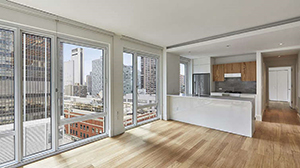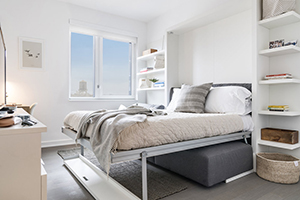EMERGING TRENDS IN RENTALS
THE ADVENT OF THE LIFESTYLE BUILDING

By Michael Stoler
An influx of new co-living and residential shared housing rental apartments throughout the metropolitan area are transforming the marketplace. This is in response to a desire among city dwellers to cultivate an all-inclusive in-house experience that champions community building and optimizes efficiency in tight living quarters.
Co-living caters to upwardly mobile, single young professionals seeking convenience, flexibility, and community in their living situations. Most co-living company real estate buildings offer all-inclusive dorm-style housing with floorplans that optimize living and common areas for socializing and maximize efficiency in units that are smaller than the average studio.
DECONSTRUCTING CO-LIVING HOUSING
The major co-living companies within the metropolitan area include WeLive, Ollie, Common, Node, Krash, Pure House and TRIBE. Private-equity investors and pension funds have founded a large percentage of the co-living companies, providing services that blend flexibility with ease to feed the emerging demands of their target demographic. These companies offer leases from one month to one year, and most residences are pre-furnished to include communal kitchens stocked with dishes and cooking utensils, high-speed internet, TV’s wired for cable and housekeeping amenities.

Community-building activities are another unique offering of these co-living spaces which feature movie screenings, wine tastings, cooking classes, roof decks, party rooms, and hot tubs. A single person in a co-living space can spend anywhere from $1,500 to $3,000 per month based on location, size of units and amenities provided.
According to the Wall Street Journal, New York apartment developers the Durst Organization tested how traditional real estate companies can provide co-living space within a new building for budget-conscious millennials. The Frank 57 West, located at 600 West 58th Street, is a residential building that offers several housing options. Renters can select from a three-bedroom, two-bath apartment, unfurnished or furnished, with fold-up beds in the bedrooms to give occupants more floor space, as well as couches and tables. Residents can spend between $6,200 to $7,200 a month, or $2,067 to $2,400 per person. Cleaning and valet services are also available.
Developers have also tested the concept of micro-sized apartments, providing a plethora of tailor-made services for residents who don’t wish to compromise between engaging in booming social experiences in exchange for small living quarters.

MICRO-SIZED APARTMENTS
In 2016, Carmel Place, a nine-story modular building at 335 East 27th Street, was one of the first micro-sized apartment buildings in Manhattan. The building welcomed their first residents, offering 55 studios ranging from 260 to 360 square feet. Renters could select the all-inclusive amenities and services package curated and managed by “Ollie.” The Ollie package provided high-speed Wi-Fi and premium television programming, hotel-style housekeeping every two weeks and social club membership including community and fitness events. A fully furnished 310 square foot micro studio including smart TVs, desk, and chairs listed for $2,850 per month. In contrast, an unfurnished 300 square foot micro studio was offered at $2,562 per month.
The Uno, located at 1 Larkin Plaza in Yonkers, built on this emerging trend by offering 50 micro and 50 loft apartments in their converted building that combines the 1923 historic Otis Elevator building with the former Herald Statesman building. Its strategic location to Manhattan and unique floorplan appeals to young professionals and empty nesters alike. As reported in Lohud.com, “The whole idea of this building is to create a lot of common space where people can congregate and hang out” said Joseph Cotter, the developer, and president of National Resources. “It’s a lifestyle building.” Large loft units range from $1,800 to $3,600 per month, offering 700 to 1,200 square feet. Smaller studio micro-flats start at $1,500, ranging in size from 350 to 450 square feet with a pull-down Murphy bed in each unit.

IN-HOME COMMUNITY EXPERIENCE
The Urby building chain promotes in-home community engagement through their unique approach to residential housing, with locations in Staten Island and Jersey City, NJ.
Recently Jersey City Urby, now one of the area’s tallest buildings standing 69 stories, welcomed its first residents. The skyscraper features a mix of studios, one- and two-bedrooms, ranging from $2,000 a month for a studio, one bedroom at $2,300 and two bedrooms at $3,400. As reported in Curbed2, much like its sister project on Staten Island, the development places a strong emphasis on community-building amenities. Included are a fully-equipped gym, a heated pool, a coffee shop and classes in a communal kitchen where local chefs host demonstrations and tastings.
As reported in the New York Times, the Urby Staten Island in the Stapleton section, offers residents a communal kitchen, urban farm, 20-hive apiary, an in-residence chef, rooftop gardens, kitchen composters, art and meditation studios, bike shares, infrared saunas, and even an adult treehouse.
As the real estate industry pushes toward new frontiers to satisfy the growing demands of emerging trends, one constant appears to be true: if you build the premier, all-inclusive co-living or micro-apartment community-centric residence, they will come.









